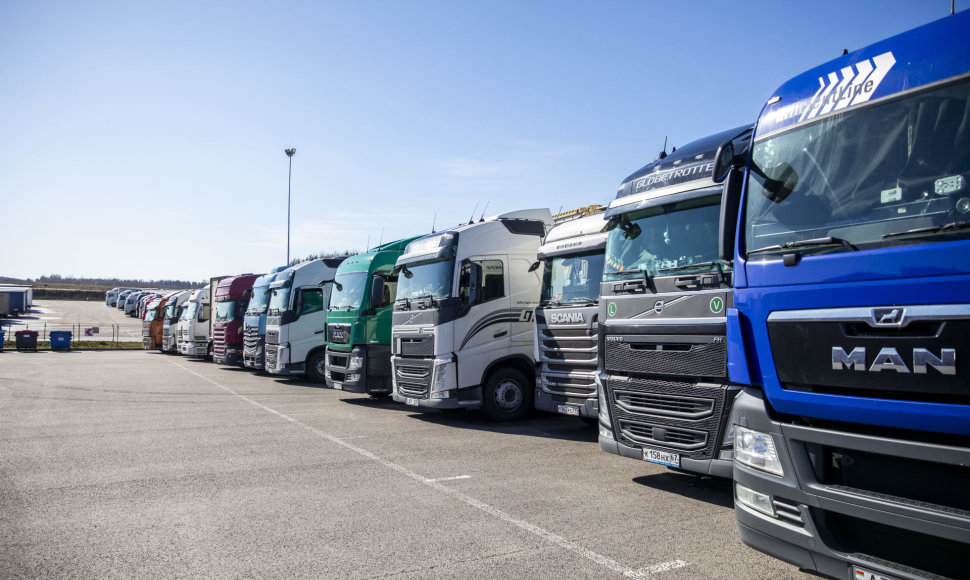Such is the new reality for the transport sector, whose haulier businesses are striving to survive under coronavirus pandemic conditions, according to the newest haulier survey.
“Due to the global coronavirus outbreak, the entire transport and logistics chain, which is dependent on industrial manufacturers, importers and exporters, is facing massive pressure. Under current crisis conditions, the largest challenge for hauliers is to ensure uninterrupted freight transport between EU states, ensure logistics capacities of the export of Lithuanian manufactured goods and most importantly – retain jobs without losing company liquidity,” Linava secretary for transport policy Tomas Garuolis says.
He emphasises – the situation on the market is very complicated, international freight demand has significantly decreased across the European Union. From March, due to reduced freight carrying levels, individual companies have recorded losses of revenue ranging from 50 to 90%.
“We face not only a lack of working capital, but also a particularly difficult situation in the financial service sector – borrowing from commercial banks is hardly possible. Purchase lease payment burdens also contribute because almost the entire truck park has been obtained by purchase lease,” T. Garuolis says.
Through a survey of Lithuanian transport companies, it was revealed that the reduction in orders and decreased turnover is experienced by an entire 93% of companies. Based on the survey, 15% of companies indicated that their turnover during the first quarter of this year has dropped by half, 16% - from 31 to 50% and 38% of companies – from 11 to 30%.
“These are massive numbers. The profitability of transport companies in international freight was on average around 3% prior to the pandemic. During this difficult period, the margins have shrunk to a minimum. In the European market, haulier competition is vast – news has reached us that some major European transport companies, seeking to remain in the market, are working with zero, sometimes even negative margins,” T. Garuolis says.
According to him, market realities are currently dictating conditions for transport companies, which don’t even discuss what to earn profits from and instead are primarily seeking ways to survive, trying to balance company finances and retain liquidity.
“Companies are forced to halt some of their trucks, in some, hundreds are standing idle without cargo, but loans and staff wages must be paid. We understand clearly that currently, the circumstances of all businesses are critical – just I Lithuania, manufacturing has dropped by 40%, while in some European regions, manufacturing has decreased by up to 90% and this has very painful consequences for our business. In order to maintain it, it appears that European Union countries will need to take up extra measures,” T. Garuolis says.
Another problem accompanying reduced-order numbers is belated payments – 51% of respondent company heads say that payments from clients are belated by more than 20 days, there are also requests for postponement of up to 3 months.
More than half – 52% - of respondent companies are already facing a lack of working capital, while 61% of companies specify that they are beginning to struggle to pay taxes and make payments to credit institutions.
Currently, due to the reduced number of orders, most companies are not making full use of their truck parks. The crisis has most impacted transportation by tent trailers – almost 70% of companies were forced to partially or completely halt operations for these. A third of surveyed companies say that more than 30% of their available tent trailers are not out transporting shipments.
“While food industry products, medication, medical supplies and agricultural production might currently be travelling on international routes with little trouble, freight of other types has either been greatly reduced or completely halted. For example, car carrier trailer transport, certain raw material and industrial goods transportation by containers and semi-trailers have vastly decreased.
Despite drastically reduced-order numbers, companies strive to retain their drivers, an entire 53% of companies have yet to dismiss any staff, while 36% have had to reduce their staff numbers by up to 10%.
“So far, companies are hanging on, but moods are pessimistic. 95% of company heads think that the second quarter of this year will be even worse and around a third of them think that aside from extra financing, it might be difficult to remain afloat,” T. Garuolis summarises.
The haulier survey was performed by the national road carrier association Linava and the International Transport and Logistics Alliance in order to promptly evaluate the impact of COVID-19 on the transport sector based on business expectations. The survey featured 111 transport companies.












